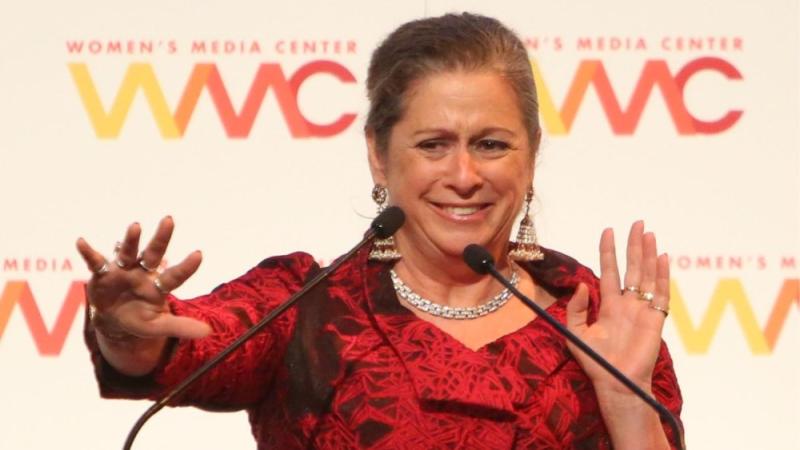Disney Heiress Calls Out Company's Worker Pay Practices


After stirring a flurry of reactions over her Tweets calling out wage inequality at the Walt Disney Co. on Sunday, Abigail Disney, a filmmaker and philanthropist who is the grand niece of Walt Disney, penned an opinion column outlining her arguments against Disney’s pay practices.
In her op-ed, which was published in the Washington Post with the headline “It’s time to call out my family’s company — and anyone else rich off their workers’ backs,” Disney said the pay of Robert Iger (which she says was $65 million in 2018, according to Equilar) was “naked indecency.”
“That’s 1,424 times the median pay of a Disney worker. To put that gap in context, in 1978, the average CEO made about 30 times a typical worker’s salary. Since 1978, CEO pay has grown by 937 percent, while the pay of an average worker grew just 11.2 percent,” pointed Disney, adding that this “growth in inequality has affected every corner of American life.”
She said Disney gave more than 125,000 employees a $1,000 bonus in in 2018 but then spent $3.6 billion to “buy shares back to drive up its stock price and thus enrich its shareholders.”
Disney issued a statement to Fast Company about its compensation, saying that “Disney has made historic investments to expand the earning potential and upward mobility of our workers, implementing a starting hourly wage of $15 at Disneyland that’s double the federal minimum wage.”
But the Disney heiress said the company has also lobbied against a ballot initiative to increase the minimum wage to $15 an hour for certain employees in Anaheim. The ballot eventually passed last November.
She ended her op-ed suggesting that the Walt Disney Co. leadership start “(rewarding) all the people who make (the company) successful, help rebuild the American middle class and respect the dignity of the men and women who work just as hard as (they) do to make Disney the amazing company it is.”





We are beginning to see a stirring over worker pay which hopefully will culminate within a couple decades into a widespread belief that CEO's and high end execs should make less, and investors should make less, and workers should make more. That is the meaning of "income equality" , and for the first time in a long time it is becoming an everyday political issue.
The people making the noise on this issue are bad at both math and economics. They have childish, emotional reactions to the announcement of CEO salaries along the lines of "that's not fair!!"
The real problem is not inequality, it's poverty and lack of opportunity. The real solutions have less than zero to do with CEO pay and everything to do with raising educational standards. But that's a problem that actually requires thought, not just feelings, so they stick to whining about how much money somebody a few dozen people make.
If workers are dissatisfied with their pay, it would behoove them to seek employment elsewhere, or to start their very own business, with all the risks that entails.
Or unionize.
Sure thing--perfectly legal, and nothing is stopping them from doing so.
Pay needs to keep up with inflation, or else the very wealthy are going to start losing their heads. The French aristocracy found that out the hard way.
This might be a factor in why the wealthy are hiring more security and not flaunting their wealth and foolishly taunting the peasants who work for peanuts in order to support the lavish lifestyles of the trust fund babies. The vast majority of wealthy people did not work for their wealth.
and an article on security concerns and expenses...
The statistic you cite is deceptive. Given the source, I suspect intentionally so.
Wealth not coming from "wages and salaries" is very different from "not working for their wealth". Indeed most of America's richest people worked very hard for their wealth, building companies that are now worth billions. None of that appeared on their W-2. That doesn't mean they didn't work their asses off.
At what exactly? Manipulating interest rates and stock prices?
Main Street suffers at the expense of Wall Street. This is not a sustainable situation.
Building a business.
If you read your first cited article carefully, you saw that 63% of the wealth of the top 1% is in "business equity". That's not publicly traded stocks, which are a different category. It's equity in businesses they have built.
From your most recent citation:
and
Main Street suffers because of its own financial ignorance, perpetuated by an educational system that is still debating whether or not it wants to move forward and participate in the 1970s or revert back to the good ol' days of the 1950s.
Yes, money does continue to flow to those who understand how to make it.
Most of America is so ignorant about money they think it's finite and that rich people having more means they have less.
If it is via Wall Street, then it is via speculating on the prices of food, energy, healthcare and education - necessities of life and holding down "expenses" in order to return a profit to the speculators. Why is it legal to profiteer from denying or exploiting human necessities?
Some people see this existence as a dog eat dog proposition.
Usually do not wind up with tens of millions of dollars in their lifetime. And are actually working instead of profiteering by gambling on Wall Street.
Let's include the remainder of that paragraph.....
There are any number of psychological reasons why this happens. Some societies have enough people who have evolved beyond this mindset, but in the US, war is still our #1 domestic and international business. How many trillions of dollars haves been wasted on unnecessary wars in the last 17 years?
Our elected leaders budget almost a trillion dollar a year for just military maintenance and expansion without much notice by the majority of our population. However, it is a call to arms if the medical insurance industry is threatened by Medicare for all. Heaven forbid, if the banksters and Wall Street have any oversight and regulators. Repeal of the Glass Steagall act was one of the most heinous things ever done to US citizens.
We have far too many citizens' lifestyles tied up in speculating on Wall Street without giving due consideration for the harm it is causing domestically and throughout the world. I believe that the majority of them honestly do not realize the harm they are causing to others, but I could be 100% wrong. It could well be that they honestly do not care at all.
Whether they care, or, not, they will find a way to rationalize it. Usually the rationale is that they have done something outstanding or otherwise deserving of great financial reward. And they are better than the average everyday slob.
People who are amoral can easily rationalize exploiting others. One of my favorite movie quotes is from The Magnificent Seven. The bandit leader Calvera rationalizes why it is ok for him to steal from the poor farmers to get food for his gang "If God did not want them sheared, he would not have made them sheep" , he says.
The VAST majority of money on Wall Street is loaned out to provide capital for everything from housing to roads to schools to new factories creating new jobs. The bond market dwarfs the stock market which dwarfs the commodities market.
Describe in detail exactly how you think this "profiteering" takes place.
They do, actually. The threshold for being in the top 1% of wealth is $10 million.
What was your point about the remainder of the paragraph?
It was a terrible idea. It caused the 2008 recession.
But let's keep things in perspective.
Let's not forget that we imprisoned 80,000 US citizens simply for having Japanese ancestry.
Capital markets are complicated. It's not uncommon for people to get overwhelmed by all the money being made in an environment they really don't understand and presume that it's all nefarious. It's not.
"Disney Heiress Calls Out Company's Worker Pay Practices"
GOOD FOR HER !
Hopefully she has pull within the PRIVATE company !
At least she wasn't advocating for "Government" to fix it !